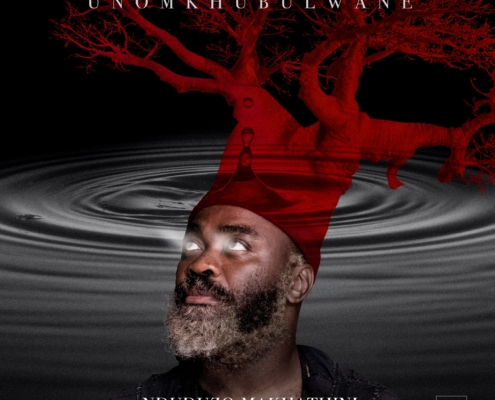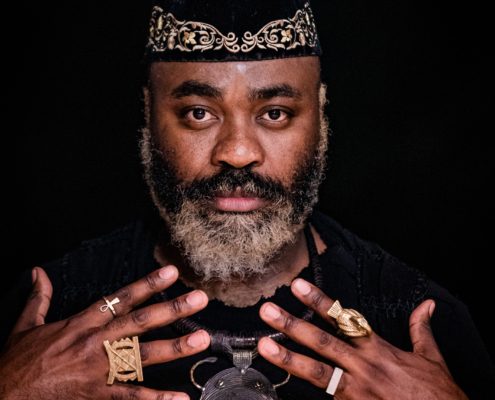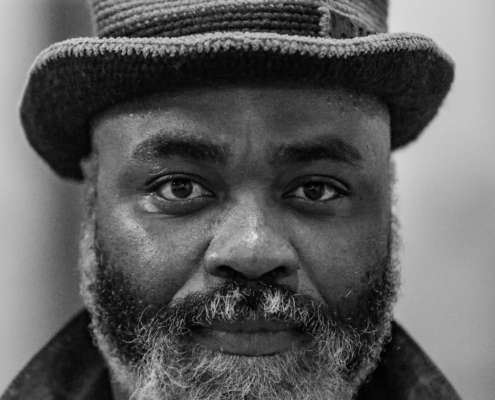- Libations: Omnyama 6:06
- Libations: Uxolo 4:22
- Libations: KwaKhangelamankengana 6:27
- Water Spirits: Izinkonjana 6:35
- Water Spirits: Amanxusa Asemkhathini 4:32
- Water Spirits: Nyoni Le? 5:20
- Water Spirits: Iyana 7:35
- Inner Attainment: Izibingelelo 6:40
- Inner Attainment: Umlayez’oPhuthumayo 4:37
- Inner Attainment: Amanzi Ngobhoko 5:42
- Inner Attainment: Ithemba 4:19
Nduduzo Makhathini – piano & vocals
Zwelakhe-Duma Bell le Pere – bass
Francisco Mela – drums
Live:
12.05.24 Berlin Xjazz Nduduzo Makathini with Omer Klein & Studnitzky
Am Mo., den 13.05.24 steht Nduduzo Makhathini in Berlin für Promotion zur Verfügung.
Der visionäre südafrikanische Pianist, Komponist, Philosoph und Heiler Nduduzo Makhathini legt mit „uNomkhubulwane“ seinen elftes Studioalbum und insgesamt drittes auf Blue Note Records vor (nach „Modes of Communication: Letters From The Underworlds“ von 2020 und „In The Spirit Of Ntu“ von 2022).
Das kraftvolle, tiefgründige Werk, bestehend aus drei Sätzen, präsentiert Makhathini in Triobesetzung mit Zwelakhe-Duma Bell le Pere am Bass und Francisco Mela am Schlagzeug.
Nduduzo Makhathini, der erste südafrikanische Jazzmusiker, der von Blue Note unter Vertrag genommen wurde, kam am 24. September 1982 in uMgungundlovu nahe Pietermaritzburg in Südafrika zur Welt. Durch seinen Vater, einen Gitarristen und Sänger, und seine Mutter, die Klavier spielt und ebenfalls singt, lernte er früh, dass Musik und rituelle Praktiken in der Kultur der Zulu historisch und symbiotisch miteinander verbunden sind. Mit Jazz beschäftigte sich Nduduzo das erste Mal während seiner Highschool-Zeit. Danach absolvierte er ein Musikstudium an der Durban University of Technology, wo er sich noch mehr in die Materie vertiefte und südafrikanische Größen wie Bheki Mseleku, Moses Molelekwa und Abdullah Ibrahim, aber auch John Coltrane und McCoy Tyner als Rollenmodelle entdeckte. Anschließend sammelte erst einmal acht Jahre lang Spielerfahrungen in Bands von anderen Musikern. Erst 2014 trat er aus deren Schatten und gründete gleich sein eigenes Label Gundu, auf dem er sein Debütalbum “Mother Tongue” herausbrachte. Ein Album, das schon im Titel deutlich machte, wie wichtig ihm seine eigene musikalischen Muttersprache war.
Binnen der nächsten paar Jahre brachte Nduduzo auf dem Label noch fünf weitere Alben mit wechselnden Besetzungen heraus, die seinen Ruf als exzeptioneller Pianist, Komponist und Bandleader festigten und über die Grenzen Südafrikas hinaustrugen. Für eine Darbietung auf seinem ersten Klaviersoloalbum “Refelections” wurde er 2017 bei den All Africa Music Awards in Lagos/Nigeria als “Best Artist in African Jazz” ausgezeichnet. Ein Jahr später brachte er mit “Ikhambi” sein erstes Album bei Universal South Africa heraus, das bei den South African Music Awards (SAMA) als bestes Jazzalbum des Jahres prämiert wurde. In Europa und den USA wurde Nduduzo Makhathini vor allem durch das Zusammenspiel mit Shabaka and The Ancestors bekannt, das auf den Alben “Wisdom Of Elders” (2016) und “We Are Sent Here By History” (2020) dokumentiert ist. Shabaka Hutchings wiederum wirkte 2016 auch bei der Einspielung von Nduduzos Album “Icilongo – The African Peace Suite” mit.
2020 verhalf die Produzenten-Legende Don Was Nduduzo Makhathini mit dem Album “Modes Of Communication: Letters From The Underworlds” schließlich zu seinem Blue-Note-Debüt und dem internationalen Durchbruch. Das Album landete auf der Bestenliste für den Preis der deutschen Schallplattenkritik und trug maßgeblich dazu bei, dass DownBeat ihn im selben Jahr als einen der Musiker preiste, denen im Jazz die Zukunft gehört. Genau dies bestätigte Makhathini 2022 dann mit seinem durch und durch brillanten Album “In The Spirit Of Ntu”, das diesmal – als eines von nur elf Alben – mit dem Jahrespreis der Deutschen Schallplattenkritik dekoriert wurde. Tobias Rapp nannte es in der Jury-Begründung “ein kraftvolles Manifest für ein neues, selbstbewusstes Afrika, das das kommende Jahrhundert mitgestalten will” und meinte: “Schon lange hat niemand mehr mit so großer Überzeugungskraft behauptet, dass Jazz vor allem eine afrikanische Musik ist.”
INFO
Since making his international debut for Blue Note in 2020 with Modes of Communication: Letters From the Underworlds, the South African pianist and composer Nduduzo Makhathini has earned widespread acclaim for the genuinely spiritual transcendence of his music. For Makhathini, a Zulu healer and educator who has delved deeply into the histories and traditions of his ancestors, improvised music has never been merely about aesthetics or idioms. As the New York Times put it when naming Modes of Communication one of the Best Jazz Albums of 2020: “In a moment when spiritual jazz has become a dangerously buzzy concept, trust a musician who has truly devoted his life to divination practices.”
But with the three-movement suite uNomkhubulwane, his third release for the venerated jazz label, Makhathini travels beyond any existing notion of music-making to offer his most profound vision of creative mysticism yet. Unlike his previous records, Makhathini explains, “which often expressed intention through composition or some form of conceptual paradigm,” the pianist seeks inspiration on a wholly metaphysical plane — using sound as a way to commune with, as he puts it, “supernatural voices.” To say it another way, rather than relying on the celebrated work of his American and African jazz heroes, or even on the probing research in his academic fields of study, Makhathini opts here to tap into the pure essence of being — an otherworldly effort that involved “listening-hearing-sensing and establishing a relationship with an ‘elsewhere’ through some guidedness.” Throughout uNomkhubulwane, Makhathini acts as both a futurist and an ancient, venturing into the unknown by exploring concepts that return him to the dawn of time.
Remarkably, he has crafted an inviting, immersive listen that should once again impress devotees of John and Alice Coltrane, Pharoah Sanders, classic South African jazz, Makhathini’s friend and collaborator Shabaka Hutchings and other intrepid musical voyagers. uNomkhubulwane features the pianist’s trio—an intuitive unit whose extensive touring has spanned the globe over the past year—with Zwelakhe-Duma Bell le Pere, a bassist of South African descent who was born and raised in the U.S.; and the Cuban-born drummer Francisco Mela, a best-of-generation musician recognized for his work with Joe Lovano, Kenny Barron, McCoy Tyner and other lions, and for his own culture-merging work as a bandleader. The rhythm section adds passionate vocal backing, accenting and lifting up Makhathini’s sacred lead-vocal offerings.
Collectively, their touch is precise in its technique yet ethereal in its purpose — and astoundingly clairvoyant in its cohesion. On “Omnyama,” a gracefully hypnotic repeated figure bolsters the leader’s spoken-word — filled with rhythmically compelling contours and bluffs — and rousing sung incantations. The click sounds that Makhathini deploys here and elsewhere in his suite, especially the qa sound common to the Bantu languages, evoke the aural sensation of water droplets; water, at the core of the African creation story, invokes essence, which in turn invokes God.
“Izinkonjana” is an enchanting ballad that delivers the gospelish elegance of such South African greats as Abdullah Ibrahim. Similarly, “Uxolo” comes off as a vintage American jazz standard, beautifully showcasing the ensemble’s shared temperament and keen sense of interplay. Twilit and nostalgic and featuring an outstanding bass solo, “Uxolo” sounds as if it could have been captured at the Village Vanguard in 1961. “KwaKhangelamankengana” is highlighted by its percolating whirlwind of groove, as well as the leader’s speak-sing vocal and hammered chording, which calls to mind McCoy Tyner, one of Makhathini’s guiding lights in finding the continuity between American jazz and the Mother Continent.
So many fascinating evocations, and yet uNomkhubulwane contains a backstory unlike anything in recorded music. To start, Makhathini’s 11-track suite takes its title from the Zulu name of “God’s only daughter and a manifestation of God’s very creation purpose,” the pianist explains. “She is also believed to be a mythical rain goddess, a regulator of nature, light and fertility.” A shapeshifting force, uNomkhubulwane can manifest in the form of an animal, or a hurricane or a rainbow — the lattermost of which, Makhathini says, symbolizes her “kindness and regulation of balance.”
uNomkhubulwane is an essential presence in Zulu life: She lives with the people as a protector and a source of equilibrium that makes “abundance” — a word Makhathini uses often, to signify prosperity — a possibility. Makhathini strives to dissociate the actual abundance of Africa’s past from the shameful reputation forced onto the continent through colonialism. The soul and heritage of Africa is impossibly rich, complex and cultivated, he argues. But colonialism and its continuing repercussions robbed these African communities of their meaning and rightful pride. The African peoples’ sophistication and self-sufficiency went unacknowledged or, more commonly, destroyed, as these attributes were viewed as threats.
This devastation all but defines the lack of infrastructure and the surplus of exploitation — of resources, of culture — that Africa experiences today. Apartheid did a horrifically effective job of making sure the townships failed to thrive while refocusing the blame inward, back onto subjugated South Africans. Today, as Makhathini points out, Africa isn’t part of the global conversation around civilization and progress … and yet Africa invented civilization!
Makhathini’s album is a never-ending exploration of these issues — of the myriad reasons why the African people have struggled to experience the abundance of uNomkhubulwane. In seeking these answers, he uses here an “ongoing rehearsal” concept, in contrast to a performance. To put it tritely, the journey of this suite is in fact the destination — and that destination includes nothing less than “cosmic totality.” “This process,” Makhathini says, “deals with rituals of being as a state of surrender, meditation and prayer.”
The project’s three movements are a kind of pathway to embracing the spirit of uNomkhubulwane — three being a number of monumental power and meaning in Africa. “In Yoruba cosmology,” Makhathini says, “number 3 represents balance and harmony [characteristics of uNomkhubulwane]. Much broader African worldviews associate number 3 with endlessness, immortality and ongoing-ness through a triple state of being; before [ancestors], here [the living] and the future [the not-yet-born].” Three is indicated directly in the music of Makhathini’s new suite — in the trio format of the band, in time signatures, in a delightful triplet feel.
The suite emerged out of a “mother song” afforded to Makhathini during the initiation process he underwent to become a healer. There, he was immersed in water in order to encounter uNomkhubulwane, who gifted him this song. “The first movement ‘Libations,’” he says, “deals with collective black memory inside a state of protest against ongoing oppression[s],” adding that “this movement invokes an eternal state of black mourning that has made us lose our ‘voices,’ and even though we still cry, we do not have tears anymore.” The second movement, ‘Water Spirits,’ deals with vital energy and restoration — a proposal of “cleansing and summoning of essence.” The final movement, “Inner Attainment,” focuses on “freedom, hope and grace,” and the striving toward a transcendence that would bring abundance back to our current time and physical plane.
As always, Makhathini’s message is ultimately one of perpetual optimism for his people, and for all people. “Essentially, this offering is an invitation to humanity to cultivate ways of being that yearn for freedom and balance,” he says. “Here I invite you to a new mode of humanism that is oriented towards singing the songs of uNomkhubulwane.”
Weitere Infos in unserem Presseportal unter
https://journalistenlounge.de – bitte dort über den Genrefilter „Jazz“ anwählen!
PR Radio
Universal Music Jazz (Deutsche Grammophon GmbH)
Mühlenstr. 25, 10243 Berlin
Blue Note Records / Universal Music
CD 00602465185225 / LP 00602465185232
VÖ: 07.06. 2024
Live
12.05.24 Berlin Xjazz Nduduzo Makathini with Omer Klein & Studnitzky







